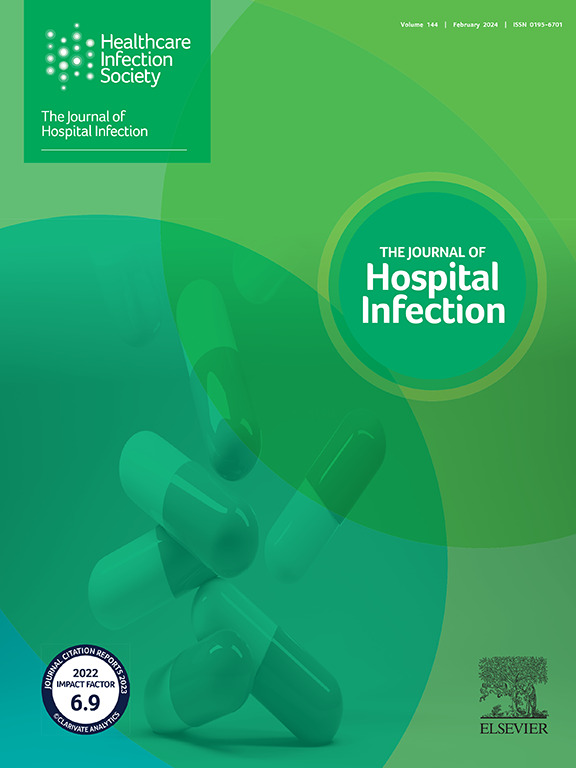评估韩国 20 家长期护理医院的抗菌药物使用情况:抗菌药物管理行动呼吁书》。
IF 3.9
3区 医学
Q1 INFECTIOUS DISEASES
引用次数: 0
摘要
背景:评估特定医院的抗菌药物使用情况对于成功实施国家抗菌药物管理非常必要。本研究旨在确定韩国长期护理医院(LCH)的抗菌药物使用情况:我们开展了一项多中心回顾性研究,评估韩国 20 家长期护理医院的抗菌药物处方模式和适当性。人工收集了 2023 年 7 月 10 日至 10 月 31 日期间各医院新开抗菌药物处方的住院患者的病历数据,以评估抗菌药物使用的适当性:结果:2023 年 7 月 12 日和 2023 年 10 月 18 日的抗菌药物处方率分别为 8.9%(365/4,086)和 10.3%(402/3,892)。740 名患者共使用了 885 种抗菌药物。在这些抗菌药物中,第三代或第四代头孢菌素(31.9%)是处方最多的抗菌药物类别。绝大多数抗菌药物(855/885,96.6%)是为治疗感染性疾病而处方的;然而,只有 37.7%(322/855)的抗菌药物是为治疗感染而适当处方的。在 99.6%(852/855)、56.1%(480/855)和 62.0%(530/855)的病例中,给药途径、剂量和处方抗菌药物都是适当的。总共有 35.2%(252/715)的患者获得了适当的抗菌药物处方。52.9%(472/892)的病例诊断为传染病。在分别用于手术部位感染预防、医疗预防和其他目的的 5 种、15 种和 10 种抗菌药物中,没有一种是合理使用的:结论:在韩国的 LCH 中,合理使用抗菌药物的比例较低。这些数据凸显了在内陆医院建立抗菌药物管理制度的重要性。本文章由计算机程序翻译,如有差异,请以英文原文为准。
Evaluating antimicrobial utilization in 20 Korean long-term care hospitals: a call to action for antimicrobial stewardship
Background
Evaluation of hospital-specific antimicrobial use is necessary for successful national antimicrobial stewardship. This study aimed to identify antimicrobial use in long-term care hospitals (LCHs) in Korea.
Methods
A multi-centre retrospective study was conducted to evaluate the prescription patterns and appropriateness of antimicrobials in 20 LCHs in Korea. The medical record data of hospitalized patients who were newly prescribed antimicrobials at each hospital were collected manually between 10th July and 31st October 2023 to evaluate the appropriateness of antimicrobial use.
Results
The prevalence of antimicrobial prescriptions was 8.9% (365/4086) and 10.3% (402/3892) on 12th July 2023 and 18th October 2023, respectively. In total, 885 antimicrobials were prescribed to 740 patients. Among the antimicrobials, third- or fourth-generation cephalosporins (31.9%) represented the most prescribed antimicrobial class. A large majority of antimicrobials (96.6%, 855/885) were prescribed for the treatment of infectious diseases; however, only 37.7% (322/855) of antimicrobials were prescribed appropriately for infections. The route of administration, dosage and prescribed antimicrobial were appropriate in 99.6% (852/855), 56.1% (480/855) and 62.0% (530/855) of cases, respectively. In total, 35.2% (252/715) of patients were prescribed antimicrobials appropriately. The diagnosis of infectious disease was appropriate for 52.9% (472/892) of cases. Of the five, 15 and 10 antimicrobials used for surgical site infection prophylaxis, medical prophylaxis and other purposes, respectively, none were used appropriately.
Conclusion
The proportion of antimicrobials used appropriately is low in Korean LCHs. These data highlight the importance of establishing antimicrobial stewardship in LCHs.
求助全文
通过发布文献求助,成功后即可免费获取论文全文。
去求助
来源期刊

Journal of Hospital Infection
医学-传染病学
CiteScore
12.70
自引率
5.80%
发文量
271
审稿时长
19 days
期刊介绍:
The Journal of Hospital Infection is the editorially independent scientific publication of the Healthcare Infection Society. The aim of the Journal is to publish high quality research and information relating to infection prevention and control that is relevant to an international audience.
The Journal welcomes submissions that relate to all aspects of infection prevention and control in healthcare settings. This includes submissions that:
provide new insight into the epidemiology, surveillance, or prevention and control of healthcare-associated infections and antimicrobial resistance in healthcare settings;
provide new insight into cleaning, disinfection and decontamination;
provide new insight into the design of healthcare premises;
describe novel aspects of outbreaks of infection;
throw light on techniques for effective antimicrobial stewardship;
describe novel techniques (laboratory-based or point of care) for the detection of infection or antimicrobial resistance in the healthcare setting, particularly if these can be used to facilitate infection prevention and control;
improve understanding of the motivations of safe healthcare behaviour, or describe techniques for achieving behavioural and cultural change;
improve understanding of the use of IT systems in infection surveillance and prevention and control.
 求助内容:
求助内容: 应助结果提醒方式:
应助结果提醒方式:


